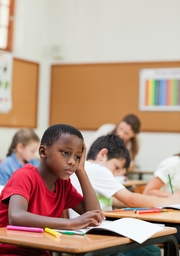Does Social Media Decrease Kids’ Attention Span?
We live in a digital age, with new technology developing faster than we can keep up. Information and entertainment are available at our fingertips through the Internet. As a result, many people have gotten used to the instant gratification that comes with scrolling social media–especially kids who have grown up with it.
It often seems like kids can’t focus as well as they used to, which some think is a result of social media and screen use. Does social media decrease kids’ attention? The answer is more complicated than you might think.
Where Do Attention Spans Come From?
Everyone gets distracted, often at certain times of the day. It’s why energy drink advertisements talk about “that 2:30 feeling” or “the afternoon slump.” You’ll have periods when you feel more productive and energetic and others where almost anything can bring you out of the task at hand. The same goes for kids.
When babies are born, their brains have 100 billion neurons. While they arrive well-equipped, they spend their early years learning to make connections between those neurons. Your child’s brain develops as they have interactions and experiences.
We take in more information in the first five years of life than the rest of it put together. The brain will create new connections throughout the first decade, and its cells will grow.
How Social Media Affects Children’s Attention Span
Kids get easily distracted because their brain uses all the input around them to create a neural network that will guide their thoughts and actions throughout their life — social media or no social media, that would be the case. However, social media can often make it worse.
Sleep Deprivation
Circadian rhythm affects our kids’ attention span. When tired, children are less likely to pay attention to things. Adults need between seven and nine hours each night, but kids need between nine and 14 hours, depending on their age and routine.
Since their brains take in so much information during the day, a good night’s sleep is vital to correctly processing it. If not, they could get stuck processing yesterday’s information as they’re exposed to even more. Staying up late on social media is a major distraction that can cut into precious sleep time.
Plus, blue light from screens can impact sleep quality. The light suppresses melatonin — a hormone needed for deep, adequate sleep. Experts recommend putting away all devices two to three hours before bed, so their brain has enough time to unwind before sleep.
Habit
Both kids and adults with devices can fall into scrolling social media as a habit. What started as something to check in on a few times a day became something we look at in any free moment. For some, having a device within reach makes them want to check their Facebook or Instagram accounts or scroll through TikTok.
Devices are an easy, quick fix for overwhelmed parents. A phone or tablet can be a savior on a road trip or when waiting for an event. However, the more kids get used to filling that empty time with streaming and social media, the more their brains will fall into the habit of always using it.
There’s a reason experts recommend limited screen time for kids. Too much multimedia multitasking with social networks, games and videos can negatively impact sensorimotor development, executive functioning and academic abilities. Getting into a habit of accessing the devices can prevent them from learning emotional regulation, environmental observation and other vital skills. With constant stimulation, the brain never gets the chance to get creative.
Kids and adults are now getting many small bits of information instead of a few long segments. When kids aren’t used to listening to a lesson or playing a lengthy game, they’ll find it harder to focus when they need the discipline to be academically and professionally successful.
Time management is one of the most essential skills for academic success. However, many students struggle with focus and tend to procrastinate, often wasting time on the Internet.
Social media can become an addiction for some kids, where their brains release dopamine when checking a platform. The desire to do it takes them away from experiencing the moment.
Anxiety
While some social media platforms have kids-specific apps that filter out vulgar language or photos, they can’t filter out the comparisons that begin at a young age. From toddlerhood, kids notice when someone else has something they don’t.
The fear of missing out can distract kids from what they have and the path ahead. Everyone is different, but impressionable young minds don’t always see it that way. Teenagers, in particular, face risks of cyberbullying over their posts and strive to mimic influencer attitudes and experiences — even if they don’t represent who they are.
Anxious comparison affects the attention span by putting the nervous system on edge. Research shows that anxiety from social media can create similar symptoms to attention deficit hyperactivity disorder (ADHD). It keeps their mind from focusing on learning, chores or even entertainment. Social networking sites’ different posts, photos and hashtags constantly occupy them.
Helping Your Kids Improve their Social Media Activity
It’s clear how social media impacts attention spans, especially among children. Working with kids to improve their habits and lengthen their focus is important. Practicing being away from screens and engaging in longer activities with them can help them break the habit. Make a few small changes and the difference in their attention span may surprise you.
 Author bio: Cora Gold is the Editor-in-Chief of women’s lifestyle magazine, Revivalist. She strives to live a happy and healthy life with her family by her side.
Author bio: Cora Gold is the Editor-in-Chief of women’s lifestyle magazine, Revivalist. She strives to live a happy and healthy life with her family by her side.
Follow Cora on Facebook and LinkedIn.




